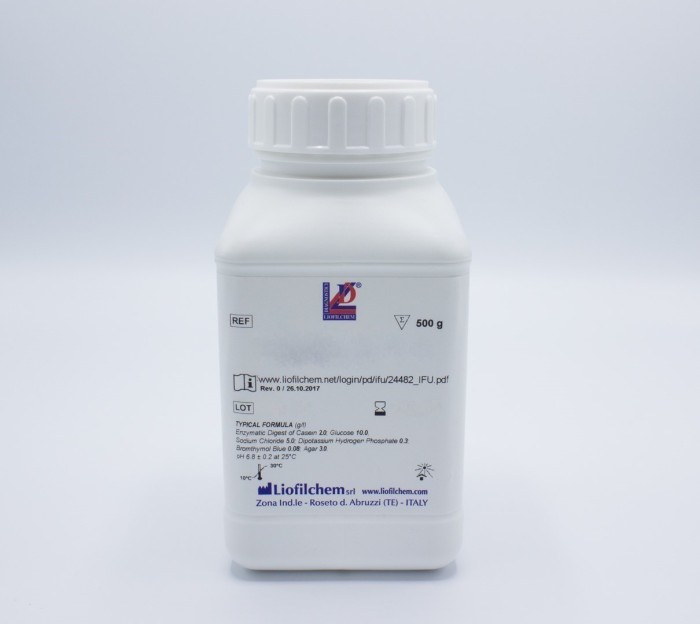Specifications:
| Application | Microbiology | ||
| Storage Temperature | Ambient | ||
| Product Type | Culture Medium | Forms | Powder |
| Product Brand | Liofilchem | Target Organism Class | Yeast, Fungi |
| Product Grade | Microbiology grade | ||
Sabouraud Dextrose Agar (SDA) is a versatile microbiological medium designed for the cultivation, isolation, enumeration, and maintenance of yeasts and moulds from clinical and non-clinical specimens. Its acidic pH and high dextrose concentration make it highly selective for fungal growth while suppressing bacterial growth. SDA complies with international standards, including EN ISO 11133, USP, EP, and JP, making it suitable for diverse applications such as food testing, environmental monitoring, pharmaceutical quality control, and medical diagnostics.
Key Features:
- Universal Application:
- Suitable for clinical (e.g., infectious disease diagnostics) and non-clinical (e.g., food, water, and environmental monitoring) purposes.
- Widely used in pharmaceutical quality control for non-sterile products.
- Formulation and Composition:
- Pancreatic Digest of Casein (5.0 g/L) and Peptic Digest of Animal Tissue (5.0 g/L) provide essential nutrients for fungal growth.
- Dextrose (40.0 g/L) serves as a fermentable carbohydrate and energy source.
- Agar (15.0 g/L) solidifies the medium.
- Final pH: 5.6 ± 0.2 at 25°C for optimal fungal selectivity.
- Complies with Global Standards:
- Meets the harmonized methods in United States Pharmacopoeia (USP), European Pharmacopoeia (EP), and Japanese Pharmacopoeia (JP).
- Conforms to EN ISO 11133 for quantitative microbiological testing.
- Versatile Formats:
- Available as dehydrated medium, pre-poured plates, and bottles, including gamma-irradiated triple bagged plates for use in clean rooms and isolators.
- Bacterial Inhibition Option:
- Chloramphenicol can be added to suppress bacterial growth, enhancing fungal recovery.
Specifications:
- Physical Properties:
- Dehydrated medium: Light beige, homogeneous, free-flowing powder.
- Prepared medium: Slightly opalescent, light amber.
- Shelf Life:
- Dehydrated medium: 4 years.
- Medium in bottles: 2 years.
- Prepared plates: 6 months.
Preparation:
- Dehydrated Medium:
- Suspend 65 g of powder in 1 liter of distilled or deionized water.
- Heat to boiling for 1 minute, stirring frequently.
- Autoclave at 121°C for 15 minutes.
- Ready-to-Use Bottles:
- Melt bottle contents in a 100°C water bath.
- Ensure homogeneity by gently shaking.
- Cool to 45-50°C, mix to avoid foam, and pour into Petri dishes.
- Additives:
- To increase bacterial inhibition, chloramphenicol can be added to the medium.
Applications:
- Clinical Microbiology:
- Isolation and identification of pathogenic fungi such as Candida spp., Aspergillus spp., and dermatophytes from clinical specimens like skin, nails, and respiratory secretions.
- Food and Water Testing:
- Recovery and enumeration of yeasts and moulds in compliance with ISO 11133.
- Useful for monitoring contamination in food production and distribution.
- Pharmaceutical Microbiology:
- Quality control testing of non-sterile pharmaceutical products for fungal contamination.
- Environmental Monitoring:
- Passive air monitoring using settle plates in clean rooms and controlled environments.
- Surface monitoring with swab sampling or templates (10 x 10 cm).
- Industrial Applications:
- Ensures microbial safety in industries like cosmetics and beverages by detecting fungal contamination.
Incubation and Results Interpretation:
- Incubation Conditions:
- Yeasts: 30-37°C for 24-48 hours.
- Moulds: 20-25°C for 5-7 days or 30-35°C for 24-48 hours.
- Results:
- Fungal colonies are identified based on colony morphology and microscopy.
- The total count is expressed as Colony-Forming Units (CFU) per plate.
- Acceptable microbial limits (e.g., TYMC):
- 101 CFU: Maximum acceptable = 20.
- 102 CFU: Maximum acceptable = 200.
Quality Control:
- Expected Results:
- Saccharomyces cerevisiae (ATCC® 9763): Good growth.
- Aspergillus brasiliensis (ATCC® 16404): Good growth.
- Candida albicans (ATCC® 10231): Good growth.
- Productivity Ratio: ≥70%.
Advantages:
- High Selectivity:
- Acidic pH and high dextrose levels support fungi while inhibiting most bacteria.
- Versatility:
- Applicable in clinical, industrial, and environmental settings.
- Convenience:
- Available in multiple formats for various workflows.
- Compliance:
- Conforms to multiple pharmacopoeia and ISO standards.
Limitations:
- May support the growth of some bacteria, necessitating chloramphenicol supplementation.
- Not suitable for fungi that cannot tolerate high carbohydrate content, e.g., Blastomyces dermatitidis.
- Requires further testing for species-level identification.
Ordering Information:
| Format | Packaging | Catalog Number |
|---|---|---|
| Dehydrated Medium (500 g) | Bottle | 610103 |
| Dehydrated Medium (100 g) | Bottle | 620103 |
The Liofilchem Sabouraud Dextrose Agar is a robust and reliable medium for detecting, isolating, and quantifying fungi across various applications. Its compliance with global standards and adaptability to different testing needs makes it indispensable for laboratories in clinical, food, water, and pharmaceutical microbiology.
- Pack Size: 100g 500g 5kg




 0
0
